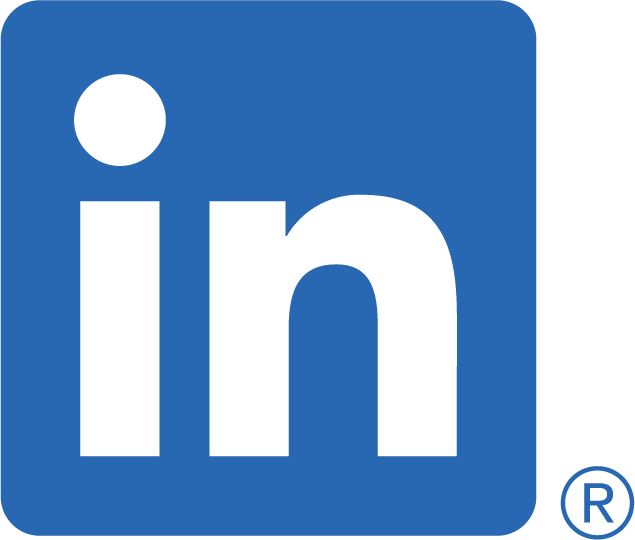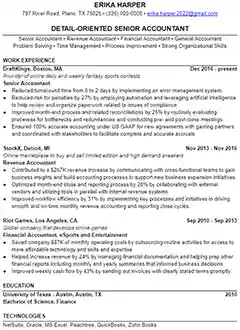Accountant Resume Example
Follow this step-by-step guide to write an Accountant resume that lands you more interviews and job offers…or have Leet Resumes write yours for free.


An Accountant Resume that Gets Interviews
It’s crunch time…and we’re not talking about numbers here.
As an Accountant, there are few things more stressful than Q1, but writing your resume has you thinking April is your favorite month of the year.
Luckily, we’re here to help.
We’ve created a step-by-step guide to help you write an Accountant resume that lands you in the job of your dreams. With this resume example and helpful guide, you’ll be fielding interview requests in no time.
Wish someone else could write your resume for you?
Try Leet Resumes. They’ll apply their expertise to craft a custom version of the resume example above. Better yet, it’s free (though tips are always appreciated).
How to Format an Accountant Resume
There are five essential sections to your resume:
- Professional Headline
- Professional Summary
- Work Experience
- Education
- Keywords
Generally Accepted Resume Principles for Accountants
Alright, so it’s not exactly GAAP, but there are some key principles to keep in mind as resume best practices. Each of these principles helps your resume stand out to land a highly-coveted interview.
Simple is best.
Debit and credit. Just like keeping the books straight requires nothing more than a couple columns and 100% accuracy, your resume is most effective with a simple and clean layout.
Skip the colors and multiple column layout to keep the focus on your skills by using the single-column structure you see in the resume example above.
Stick to the facts (no paragraphs).
You’re not submitting financials by outlining the background and context for every transaction. It’s factual, organized and streamlined for efficiency – and that’s how your resume should be, too.
Share the facts, figures and keywords of your career in lists, short phrases and bullet points. (This guide will show you exactly how to do that.)
Use this guide as a resume template.
The goal of this resume is to get an interview. The best way to do that is to customize each resume for each accounting job you apply for.
If you’re trying to calculate the efficiency of this method, we’ve done the math for you. This is the tried and true method of landing more interviews and job offers.
The final product from this article will be your custom resume template that can be targeted toward each potential employer.
Having second thoughts?
If you’d rather stick to the ledgers and leave the resume writing to someone else, we’ve got it covered. Leet Resumes will write your Accountant resume for you, and they’ll do it for free (though tips are always appreciated).
Name + Contact
First, add your full name to the top center of the page. Make it a professional and legible font slightly larger than the rest of the text.
Underneath, add your contact information: phone number, email address and location.
Be sure to use an email address that’s professional and requires no explanation for its meaning.
Professional Headline
The first part recruiters will read is the professional headline. In three to five words, you need to capture their attention right away and make them want to read more.
This is your disclosure: succinctly divulge a birds eye view of the Accountant featured in this resume, nothing more. The rest of your resume can answer their follow-up questions.
Start with a slightly flattering adjective that puts you and your career in a positive light, like: cost-effective, analytical, methodical, economical or thorough.
Then add a word to acknowledge your level of experience: senior, executive, junior, entry-level, etc.
Finally, add your official title.
When you’re finished, your professional headline should read something like this:
- Thorough Junior Accounts Payable Accountant
- Dependable Senior Staff Accountant
Professional Summary
With your professional headline doing the heavy lifting, you now have an interested audience to read your professional summary. Keep it high-level and hyper-relevant so they see you as the ideal candidate for their open position. Here’s how:
In four lines, you’ll list targeted words and phrases that match the needs they’ve outlined in the original job posting.
- Line One: all the job titles you’d accept for your next accounting position, including the specific role you’re applying for. This might include GL Accountant, Senior Accountant, Senior Tax Accountant and so on.
- Line Two: the most relevant skills that qualify you for this job. Remember, this is a high-level summary. Everything that doesn’t fit can be included in the keywords section at the bottom of your resume template. For now, keep them interested with the assets they’re most interested in (specific revenue recognitions, GAAP knowledge, excel proficiency, etc.).
The next two lines are optional. If nothing comes to mind, don’t worry about it. The first two lines are plenty to get you an interview.
- Line Three: list any notable career achievements (significant prospecti, highlights from your work experience).
- Line Four: list any accounting awards, recognitions or promotions you’ve received.
Work Experience
Instead of thinking of your work experience as your workpapers to list your daily duties and responsibilities, think of this as your ledger (but much more exciting).
You’ve highlighted why you’re the best Accountant for the open position. Now your experience and successes will quantify your value to any potential employer.
First, list your previous accounting positions in reverse chronological order with the official job title, dates of employment and your previous employer. Use the resume example above to reference the formatting.
Under each position, add a bullet point list of the ways you brought success to the company using these three items:
Success Verbs
To keep your resume focused on the results your work brings rather than the P&Ls and SURLs of the work itself, start every bullet point with a strong success verb.
So instead of “managed profit and loss statements,” “oversaw tax compliance calendar,” or “performed all tax audit activities,” your work experience should read like a highlight reel of financial success:
Accelerated revenue growth by an average of 14% quarterly by eliminating over 100 redundant expenses from profit and loss statements. Reduced late and missed filings to zero by generating a robust tax compliance calendar that was shared within 4 departments and 42 finance personnel. Secured over $4M of company assets by performing regular internal tax audits and consolidating financial records to 100% accuracy.
Numbers
The other key ingredient to those powerful bullet points above: numerical data.
Numbers give a recruiter, potential employer or CFO a clear picture of how your work affects a company’s bottom line.
Use as many numbers as possible to show your individual impact. This might include consolidated errors, savings from your findings, company growth, profit margins, size of the company’s assets, etc.
Every number you add to your resume brings you closer to an interview request, so once you feel like you’ve added all the metrics you can, go back and try to double them again. It is, quite literally, a numbers game to get your number called for an interview.
###Promotions
Promotions show your success to a potential employer from a different perspective. If your previous company thought your work was worth rewarding and expanding your responsibilities, it’s likely the quality of your work can be repeated for the next company.
Don’t be modest. Include every promotion you’ve received.
Education
After the tedious GL-like detail of the work experience, the education section of your resume template is as easy as an index match in excel.
In the same format as the resume example above, list where you went to school, the dates of your attendance, the degree(s) you obtained and any honors or awards you received.
Everything else about your collegiate career can be left off entirely. Certifications (yes, including CPA) can be included in the keywords section below.
Keywords and Skills for an Accountant Resume
At the end of your resume is a list of keywords, skills, technologies and certifications that summarize your accounting expertise.
Even though you know what it’s like to be an Accountant, your recruiter probably doesn’t. For the skills that seem too obvious to include in your resume, include them anyway (even Microsoft Excel).
Here are some ideas for your Accountant resume keywords and skills.
Hard Skills of Accounting - the qualifications and tasks your potential employer is looking for you to perform.
- Account Reconciliation
- Fixed Asset Tracking and Management
- Month-End Close Procedures
- PDC Reports
- Cash Basis Financial Records
- Financial Auditing
- State and Local Government Taxes
Soft Skills that highlight how you approach your work.
- Project Management
- Attention to Detail
- Team Player
- Excellent Verbal and Written Communication
- Strong Work Ethic
Technologies that you use in accounting.
- Microsoft Excel
- Microsoft Office Suite
- Quickbooks
- SAGE100
- Oracle
- Yardi
- SAP
Certifications outside of your degrees that are relevant to accounting.
- CPA License
- CIA
- Chartered Financial Analyst
- CGMA
- CMA
When the bottom of your resume template is filled with targeted keywords and skills that highlight your expertise, your Accountant resume is complete! Congratulations.
Can someone just write my resume for me?
Absolutely. The experts behind this resume example and guide will write your custom Accountant resume for you. Also, it’s completely free. (Tips for a job well done are always appreciated.)










